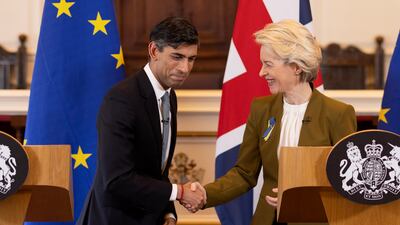The UK and the European Union have struck a new deal that should bring about a new trading arrangement following years of wrangling.
British Prime Minister Rishi Sunak will be hoping that the new agreement, which comes nearly six years after the Brexit referendum, will silence Eurosceptics in the Conservative Party and help ease tension caused by the Northern Ireland Protocol.
Mr Sunak, however, still needs broad political support — both in Westminster and in Stormont — to make the deal work.
But what exactly does the new agreement entail? Here are the key points of the Windsor Framework:
What is the Northern Ireland Protocol and why has it been a source of tension?
It was a key part of former prime minister Boris Johnson’s Brexit deal, signed in 2020, and was designed to prevent a hard border on the island of Ireland.
To keep the border free-flowing, London and Brussels essentially moved new regulatory and customs checks required by Brexit to the Irish Sea.
The move introduced red tape on trade between Britain and Northern Ireland, creating a headache for many businesses and enraging loyalists and unionists who claim the region’s place within the UK has been undermined.
The row has also left Northern Ireland without a functioning devolved government, after the Democratic Unionist Party used its veto to bring down devolution in protest against the protocol.
Its boycott means a ministerial executive cannot function and the legislative assembly cannot conduct any business.
What is in the new deal on trade?
The new Windsor Framework was announced by Mr Sunak and European Commission President Ursula von der Leyen on Monday, with the Prime Minister claiming that the agreement “removes any sense of a border in the Irish Sea”.
The Prime Minister set out a wider array of planned changes and reforms, covering trade, VAT regulation and the role of Stormont in EU laws that apply to Northern Ireland.
At the core of the deal is the creation of a new system for the flow of goods.
Anything destined for Northern Ireland will travel there as part of a “green lane”, with significantly fewer checks. Anything that could cross the border and enter the EU’s single market will travel through a separate red lane.
Mr Sunak said that the changes to the protocol will scale back the number of certificates required for traders moving goods from Britain to Northern Ireland, with customs paperwork removed, too, for people sending parcels or buying goods online.
He indicated changes to the movement of food as well, claiming that anything made to UK rules will now be clear to be “sent to and sold” in Northern Ireland. That will include sausages, one of the foodstuffs hit by protocol changes that grabbed the attention of politicians in Belfast and Westminster alike.
“If food is available on supermarket shelves in Britain, then it will be available on supermarket shelves in Northern Ireland,” Mr Sunak said.
As part of the deal, the legal text of the protocol has also been amended on VAT. Under current arrangements, EU VAT and excise rules for goods generally apply in Northern Ireland.
Mr Sunak said that would now change, with the legal text of the protocol amended to allow the government to “make critical VAT and excise changes for the whole of the UK”.
What is the role of the European Court of Justice under the agreement?
It had been expected that both the UK and the EU would try to find a way around the difficult role of the European Court of Justice. Concerns about the oversight role of the court have been raised by the DUP and some Tory backbenchers, with the issue less about trade and more about sovereignty.
The ECJ had been final arbitrator of EU legal issues in the region, given that Northern Ireland essentially remains within the single market for goods.
Details are not yet fully clear, but Mr Sunak said that a “Stormont brake” would be introduced to allow the Northern Ireland assembly to flag concerns about changes to EU rules that would have a “significant and lasting” effect.
He said that if pulled, the UK government would have a “veto”.
But speaking to reporters, Ms von der Leyen said the ECJ is the “sole and ultimate arbiter of EU law” and will have the “final say” on single-market decisions.
She described the Stormont brake as something that would be an emergency mechanism that would hopefully not be needed.
What does the EU think of the new deal?
Ms von der Leyen spoke highly of the efforts to reach a deal, calling it “historic” and saying it could open a “new chapter” in UK-EU relations.
EU officials praised Mr Sunak for helping to improve the tone of negotiations since he took office in October.
There were also positive words from European capitals. French President Emmanuel Macron hailed an "important decision", while Germany called it a good day for UK-EU friendship.
When do the changes take effect?
The Prime Minister said that the new agreement would make a difference “almost immediately”.
However, the pact is not set in stone until a joint committee under the 2020 withdrawal agreement has adopted the measures.
After that, there is likely to be some transition period before the Windsor Framework is fully implemented, for example while the EU receives access to British customs data.










